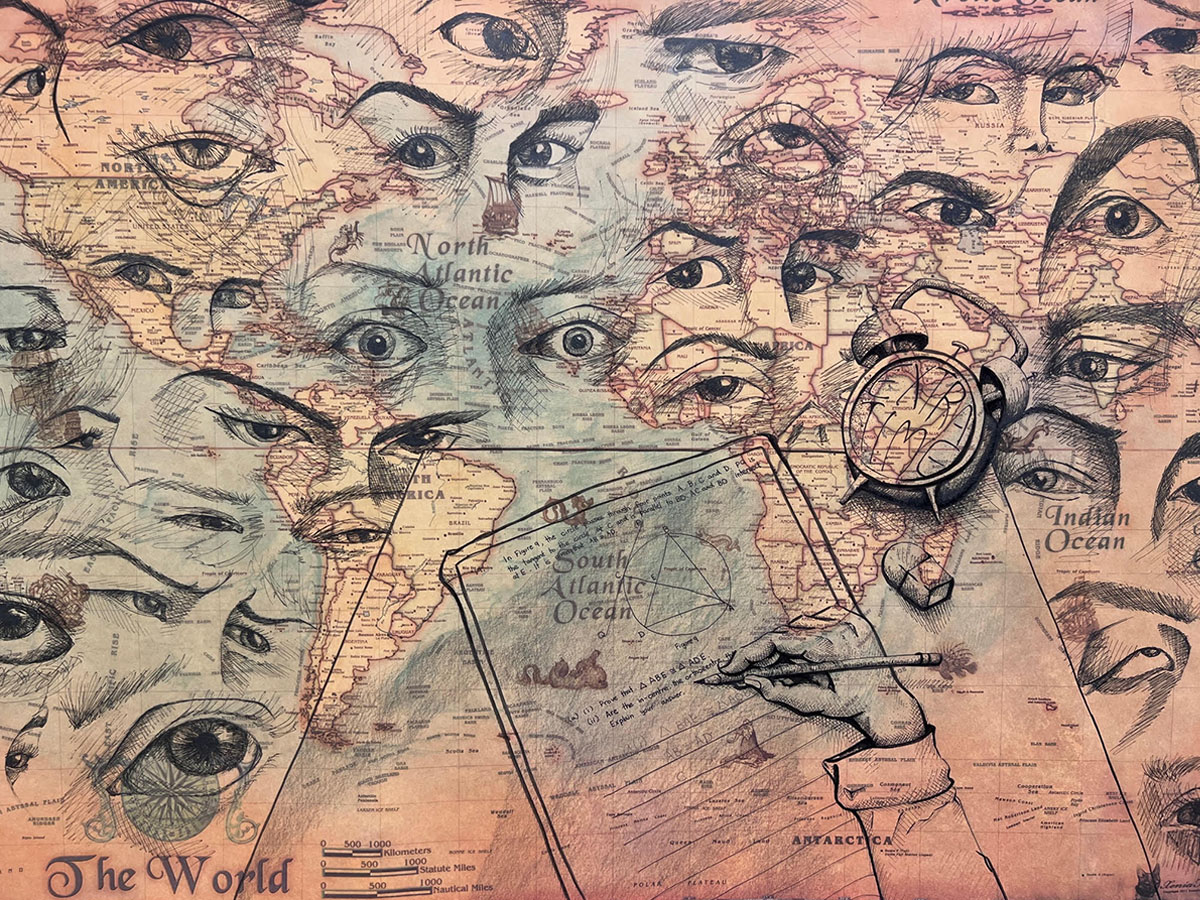Healthier communities: Nurturing physical and mental wellness
Innovation Issue 39: Spring 2024
Lessons in listening: Improving pediatric care for racialized disabled children
In Our Community
Lessons in listening: Improving pediatric care for racialized disabled children
All photos courtesy of Listening to the Margins.
A multi-faceted research and creative project led by Toronto Metropolitan University professor Fiona Moola is bringing new awareness to the unique experiences of racialized disabled children.
Listening to the Margins is a collaborative project consisting of a two-day national conference, a best practice guide for anti-racist, culturally safe pediatric health care and research, and a travelling art exhibit. The project aims to improve pediatric health care by bringing the hidden stories and lived experiences of racialized disabled children and their families from the periphery of mainstream childhood disability research and care into the light.
“Listening is an undervalued act in contemporary society. However, Black feminist bell hooks and others felt that listening could be a radical act where we learn from and with communities on the margins,” said Moola, a professor in TMU’s Faculty of Community Services’ School of Early Childhood Studies and research associate at Grandview Kids. “In the title of the conference, we tried to intentionally focus on both the margin and act of listening in decolonization. This allowed us to hear stories that have gone unnoticed. For example, conference panellist Kadeem Morgan taught us what it is like to be Black with Cystic Fibrosis.”
The project was born out of the renewed attention to the anti-Black racism movement after the death of George Floyd in May 2020. The Listening to the Margins research team felt compelled to take stock of existing research on childhood disability and race. They found a glaring gap in the research as well as a lack of support for racialized disabled children.
Developing and implementing a national conference
Professor Moola worked with project co-lead Tim Ross, a scientist at Holland Bloorview Kids Rehabilitation Hospital and University of Toronto professor, and a team of researchers to develop a conference where participants could discuss the intersectional space between childhood disability and race to gain greater knowledge about the unique experiences of racialized disabled children. The conference brought together racialized and disabled children, youth and their families and academics to share stories, listen and learn.
Efforts were made to intentionally de-centre Whiteness in childhood disability research and care at the conference. Sessions on Indigenous childhood disability explored the topic in the context of settler colonization, while sessions on the protective role of culture discussed the importance of cultural practices in building resilience and navigating disability. Through engaging dialogue, reflection and critical commentary, the conference created a deeper understanding of what it is like to navigate the health-care system as a racialized disabled child or as their parent.
“We learned that racialized cultural minority families don’t often see disability in the same way,” said professor Moola. “They often feel very unsafe and have a great sense of betrayal or lack of trust when they are moving through the health-care system. For example, families often feel rendered incompetent or less intelligent if they don't speak English in a health-care setting.”
Reflecting on lessons learned
The knowledge and lessons learned from the conference were used to develop a best practice guide for pediatric care and research that was disseminated to children’s hospitals and clinics across Canada. The guide provides recommendations for how to approach health care and research in anti-racist and culturally safe ways, such as building trust with families, being mindful of access or language barriers, and developing an understanding of how research has harmed racialized communities in the past and been used in service of colonial violence.
Art also played an important role in the project, from dance performance sessions at the conference to the creation of a travelling art exhibit. After an open call for artists across Canada, professional and non-professional racialized artists with lived experience of childhood disability or chronic illness were selected to contribute to the exhibit. Creating and viewing the art has allowed people to engage with the emotional experience of childhood disability and race.

“When we're talking about really heavy topics like ableism and racism, there is a lot of research to suggest that the arts can help deepen our emotional response, emotional resonance and empathy. I think we've been able to help people reflect and feel something about race and disability,” said professor Moola.
The art exhibit, curated by Aga Kahn photographer Joseph Cannizzaro, was first displayed at the Nielsen Park Creative Centre before moving to Holland Bloorview Kids Rehabilitation Hospital.
Listening to the Margins was conducted in collaboration with TMU graduate students Alyssa Neville, Nivatha Moothathamby and Tharanni Pathmalingam. The project was supported by the Social Sciences and Humanities Research Council of Canada.


